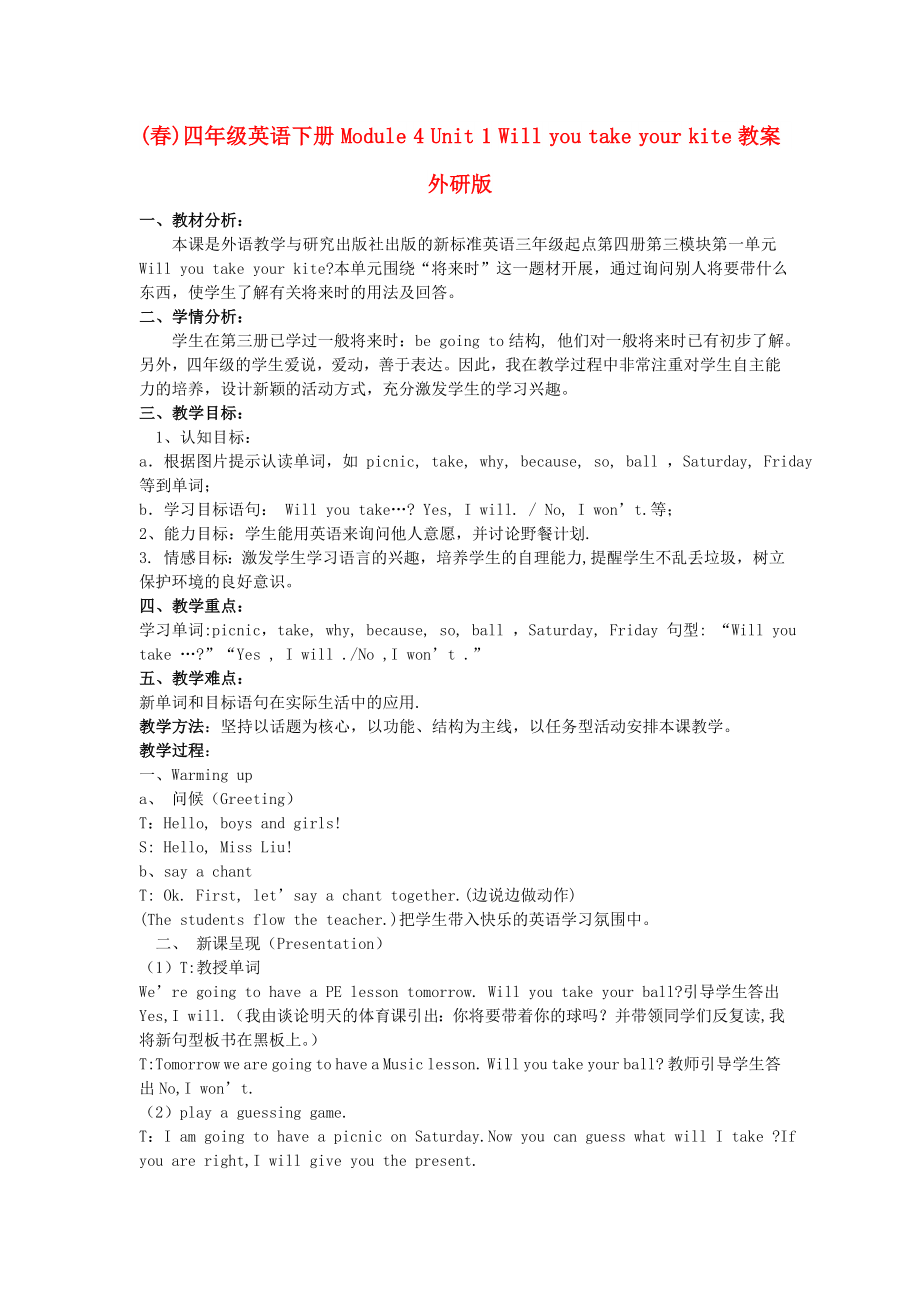《(春)四年級(jí)英語(yǔ)下冊(cè) Module 4 Unit 1 Will you take your kite教案 外研版》由會(huì)員分享����,可在線閱讀,更多相關(guān)《(春)四年級(jí)英語(yǔ)下冊(cè) Module 4 Unit 1 Will you take your kite教案 外研版(3頁(yè)珍藏版)》請(qǐng)?jiān)谘b配圖網(wǎng)上搜索��。
1�����、(春)四年級(jí)英語(yǔ)下冊(cè) Module 4 Unit 1 Will you take your kite教案 外研版
一���、教材分析:
本課是外語(yǔ)教學(xué)與研究出版社出版的新標(biāo)準(zhǔn)英語(yǔ)三年級(jí)起點(diǎn)第四冊(cè)第三模塊第一單元Will you take your kite?本單元圍繞“將來(lái)時(shí)”這一題材開(kāi)展���,通過(guò)詢問(wèn)別人將要帶什么東西��,使學(xué)生了解有關(guān)將來(lái)時(shí)的用法及回答���。
二、學(xué)情分析:
學(xué)生在第三冊(cè)已學(xué)過(guò)一般將來(lái)時(shí):be going to結(jié)構(gòu), 他們對(duì)一般將來(lái)時(shí)已有初步了解��。另外���,四年級(jí)的學(xué)生愛(ài)說(shuō),愛(ài)動(dòng)����,善于表達(dá)。因此���,我在教學(xué)過(guò)程中非常注重對(duì)學(xué)生自主能力的培養(yǎng)��,設(shè)計(jì)新穎的活動(dòng)方式����,充分激發(fā)學(xué)
2�����、生的學(xué)習(xí)興趣。
三��、教學(xué)目標(biāo):
?1���、認(rèn)知目標(biāo):
a.根據(jù)圖片提示認(rèn)讀單詞���,如 picnic, take, why, because, so, ball ,Saturday, Friday等到單詞�����;
b.學(xué)習(xí)目標(biāo)語(yǔ)句: Will you take…? Yes, I will. / No, I won’t.等���;
2����、能力目標(biāo):學(xué)生能用英語(yǔ)來(lái)詢問(wèn)他人意愿����,并討論野餐計(jì)劃.
3. 情感目標(biāo):激發(fā)學(xué)生學(xué)習(xí)語(yǔ)言的興趣,培養(yǎng)學(xué)生的自理能力,提醒學(xué)生不亂丟垃圾,樹(shù)立保護(hù)環(huán)境的良好意識(shí)�����。
四����、教學(xué)重點(diǎn):
學(xué)習(xí)單詞:picnic,take, why, because, so, ball ����,Sat
3、urday, Friday 句型: “Will you take …?”“Yes , I will ./No ,I won’t .”
五����、教學(xué)難點(diǎn):
新單詞和目標(biāo)語(yǔ)句在實(shí)際生活中的應(yīng)用.
教學(xué)方法:堅(jiān)持以話題為核心�����,以功能����、結(jié)構(gòu)為主線,以任務(wù)型活動(dòng)安排本課教學(xué)����。
教學(xué)過(guò)程:
一�����、Warming up
a���、 問(wèn)候(Greeting)
T:Hello, boys and girls!
S: Hello, Miss Liu!
b、say a chant
T: Ok. First, let’say a chant together.(邊說(shuō)邊做動(dòng)作)
(The students f
4�����、low the teacher.)把學(xué)生帶入快樂(lè)的英語(yǔ)學(xué)習(xí)氛圍中���。
?二�����、 新課呈現(xiàn)(Presentation)
(1)T:教授單詞
We’re going to have a PE lesson tomorrow. Will you take your ball?引導(dǎo)學(xué)生答出Yes,I will.(我由談?wù)撁魈斓捏w育課引出:你將要帶著你的球嗎��?并帶領(lǐng)同學(xué)們反復(fù)讀,我將新句型板書在黑板上��。)
T:Tomorrow we are going to have a Music lesson. Will you take your ball? 教師引導(dǎo)學(xué)生答出No,I won’t.
(2)p
5���、lay a guessing game.
T:I am going to have a picnic on Saturday.Now you can guess what will I take ?If you are right,I will give you the present.
學(xué)生利用句型Will you take your……?進(jìn)行練習(xí),我做出回答,猜對(duì)的將禮物送給學(xué)生��。(分小組競(jìng)賽��,及時(shí)給予小組獎(jiǎng)勵(lì)�����。)
三���、Learning the dialogue:(學(xué)習(xí)對(duì)話)
1.同學(xué)們���,很快就要春暖花開(kāi)了,在我們課本中Sam一家打算出去野餐���。讓我們一起看一下他們的安排����。OK����?Le
6����、t’s go! Please turn to page 10.
2.First, let’s listen to the tape and answer the questions. Just listen don’t read.聽(tīng)錄音��,回答下列問(wèn)題:只聽(tīng)不讀��。
(1)What are Amy and Sam going to do on Saturday?
(2)Will Amy take her kite and ball tomorrow?
(3) What will Amy take on Saturday?
Let’s check up the answers. The
7��、first one…
3.Boys and girls, listen to the tape again, and read.
4.Boys and girls, what’s the meaning of the dialogue?
Discuss in groups.
Now, who can?
讓學(xué)生在小組內(nèi)討論對(duì)話大體意思�����,然后找學(xué)生回答��。
找學(xué)生說(shuō)說(shuō)對(duì)話的大體意思����。
(星期六�����,薩姆一家打算去野餐?�,F(xiàn)在薩姆問(wèn)Amy明天帶不帶風(fēng)箏和球����,Amy說(shuō)不帶���,因?yàn)榻裉焓切瞧谒模魈觳攀切瞧谖?����。惹得Smart夫婦大笑�����。)
5.Now listen and read again.
8��、
6.Now, act the dialogue in groups.
7.Now, stop here. Who can show? ….Great! You did very well.
四����、Practice(創(chuàng)造信息溝,讓學(xué)生談?wù)撚?jì)劃���。)
情景劇表演����,活動(dòng)名稱:野餐���、游泳�����、上體育課�����、上音樂(lè)課等
具體要求:三人一組����,設(shè)置一個(gè)場(chǎng)景��,利用所學(xué)句型進(jìn)行練習(xí)并回答����。
小組內(nèi)先討論練習(xí),然后分組展示進(jìn)行競(jìng)賽�����,及時(shí)給予獎(jiǎng)勵(lì)��。
五��、吟唱chant:
Good, boys and girls, please look here.
請(qǐng)?jiān)囍脙芍焕匣⒌男稍嚦猚hant:
Will yo
9�����、u take your kite? Will you take your kite?
Yes, I will; Yes, I will.
Will you take your ball? Will you take your ball?
No, I won’t. No, I won’t.
Great!
六、小結(jié) (Summary)
1.同學(xué)們���,今天我們主要學(xué)習(xí)了哪些知識(shí)�����?
2.同學(xué)們說(shuō)得很好���,Now, look here.
今天我們主要學(xué)習(xí)了:(1).詞匯:Friday, Saturday, picnic, great, take, ball, why, because, so, will
(2).“will+動(dòng)詞原形”表示將要發(fā)生的動(dòng)作。
(3).Will you …?句式及其回答Yes, I will. / No, I won’t.
七��、家庭作業(yè):
Now, look here, homework for today:
必做: 1.Module 3單詞和Unit 1對(duì)話聽(tīng)讀5遍����。
2.所學(xué)單詞抄寫兩遍,漢語(yǔ)兩遍���。
選做: 用“Will you …? Yes, I will. /No, I won’t.”編寫三段對(duì)話��。
 (春)四年級(jí)英語(yǔ)下冊(cè) Module 4 Unit 1 Will you take your kite教案 外研版
(春)四年級(jí)英語(yǔ)下冊(cè) Module 4 Unit 1 Will you take your kite教案 外研版

